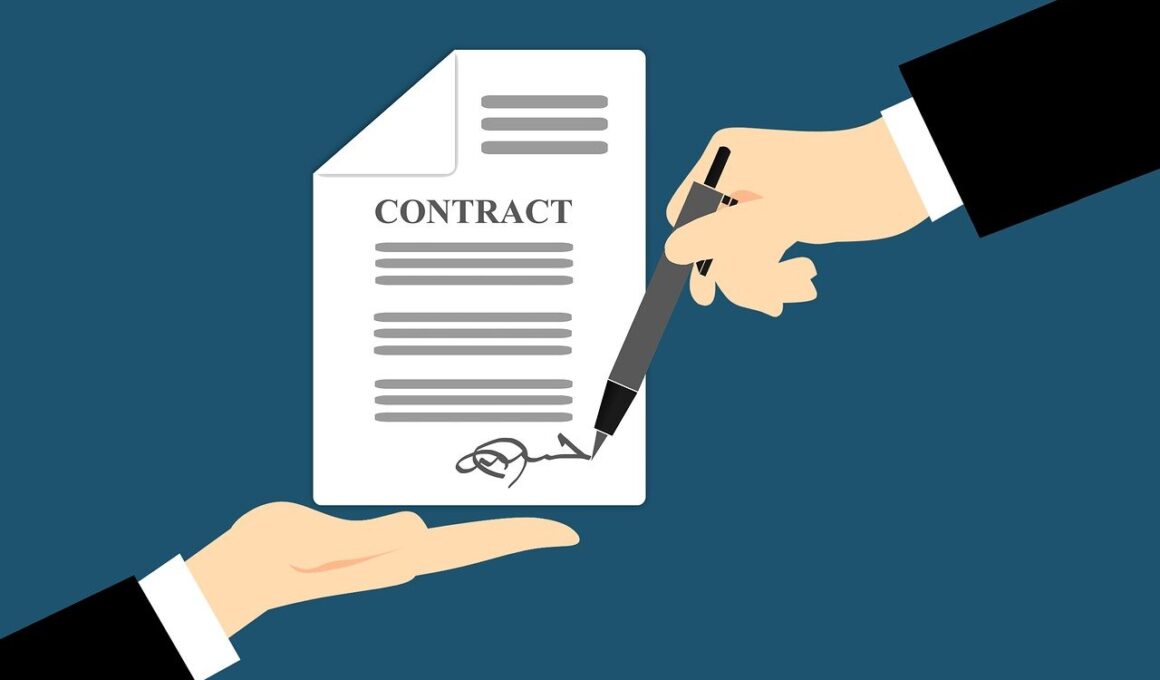Breach of Contract Claims in Employment: What You Should Know
Understanding breach of contract claims in the workplace is essential for both employers and employees. A breach occurs when one party fails to fulfill their obligations under the contract’s terms. In employment settings, this can involve issues like failure to pay wages, not providing promised benefits, or improperly terminating an employee. Recognizing these breaches can help assert rights and navigate conflicts. Employees often feel vulnerable, as they may fear retaliation if they raise concerns. However, knowing your rights under employment law is crucial. If you suspect a breach, gather evidence, such as emails or contracts, to substantiate your claim. Employers may also need to safeguard their interests by ensuring contracts are clear and comprehensive. This way, they can mitigate disputes regarding performance expectations. Employers should also consult with an employment attorney when drafting these contracts to avoid potential conflicts, ensuring that both parties understand their rights and duties thoroughly. In many jurisdictions, employees are protected by various laws against wrongful termination and unfair practices, necessitating familiarity with local legal requirements.
Seeking legal remedies for breach of contract in employment can be complex. Various factors determine the appropriate course of action, including the nature and severity of the breach and applicable laws in your region. Employees may pursue legal action for lost wages, benefits, and damages linked to emotional distress or reputational harm. Certain jurisdictions require employees to attempt resolution through negotiation or mediation before resorting to litigation. Employers might face additional repercussions, such as damages or trouble with licensing if they repeatedly breach contracts or violate employment laws. Understanding the potential outcomes and correct legal processes is crucial for anyone involved in an employment dispute. Mediation can be a more cost-effective and timely alternative to litigation, fostering amicable agreements between parties. If an agreement cannot be reached, individuals may file a lawsuit in court. This process can involve extensive documentation and witness testimony. Assessing the evidence, it’s imperative to demonstrate that a breach occurred and clarify how it caused harm or loss. Consulting with an attorney can help prepare accordingly, ensuring a thorough understanding of legal rights and options that are available.
Types of Breach and Their Consequences
There are several types of breaches to consider in employment contracts: minor breaches, material breaches, and anticipatory breaches. A minor breach occurs when one party fails to fulfill part of their obligations but the overall contract terms remain largely intact. For example, an employee may be late with a report but still delivers it as promised. In this case, employers typically cannot terminate the employment immediately. A material breach, however, fundamentally undermines the contract, allowing the non-breaching party to take significant action, such as terminating the contract. For instance, failure to pay agreed wages constitutes a material breach. Anticipatory breaches arise when one party indicates they will not fulfill their part of the contract before the due date. Understanding these types of breaches is vital for assessing if legal action is justified. Recognizing the nuances can facilitate better negotiations and conflict management. Furthermore, employees should be aware that failing to address a breach promptly might limit their ability to seek recourse later. Therefore, quick reflection on contract terms, along with legal consultation if needed, is essential to avoid long-term consequences.
In employment law, damages awarded for a breach can vary significantly based on the case’s specifics. Usually, the goal is to place the non-breaching party in a position they would have achieved had the breach not occurred. This compensation often involves financial aspects, such as unpaid wages or lost benefits. Non-economic damages linked to emotional suffering or reputational damage might also be included. It’s important to maintain thorough records, as these can support claims for damages. Employers, on the other hand, might also incur significant costs resulting from disputes, including legal fees and settlements. Additionally, they may have to deal with employee turnover and morale decline due to unresolved conflicts. Understanding these financial implications is crucial for managing workforce relations effectively. Taking proactive steps to prevent breaches—like clear communication and regular contract review—can help create a more harmonious workplace environment. Memo routines, training sessions, and open forums can help effectively address and minimize potential issues. Additionally, it is wise for companies to ensure that any contracts or agreements reflect current workloads and expectations to reduce misunderstandings.
Steps to Take After Breach
After experiencing a potential breach of contract, employees should assess the situation critically. The first step often involves reviewing the contract thoroughly to clarify specific obligations and any breach that may have occurred. Gather all relevant documentation, which may consist of emails, pay stubs, and performance records. This evidence will be crucial for establishing a case if legal action is necessary. Next, consider communicating directly with your employer to resolve the issue amicably. Document this correspondence as well, as it can further support a claim. It’s essential to approach discussions professionally to maintain a constructive dialogue. If those efforts don’t yield satisfactory results, consulting an employment attorney becomes paramount. An attorney can provide insight into your rights and evaluate the strength of your claim. They can also guide you through negotiation or litigation processes if needed. Timing is also essential in these situations, as many jurisdictions impose statutes of limitations on claims related to breaches. Delaying action can compromise your ability to seek remedies efficiently. By understanding essential steps, individuals can better handle breaches and pursue appropriate remedies.
Preventative measures can significantly reduce the likelihood of breaches in employment contracts. Employers and employees alike play a crucial role in fostering a transparent and communicative environment, wherein expectations are well-established from the outset. When crafting employment agreements, clarity is vital. Contracts should explicitly outline all duties, benefits, and performance expectations to minimize misunderstandings. Regular performance reviews and open feedback channels can help ensure that both parties uphold their contractual responsibilities. Employers must also be proactive in addressing any issues that arise promptly, avoiding escalation to breach situations. If an employee faces difficulties fulfilling their contractual duties, open discussions can lead to adjustments or support rather than breaches. Training programs that educate both parties on their rights and obligations can foster understanding and reduce risks. Additionally, periodic contract reviews can help align agreements with current working conditions. This diligence ensures that contracts remain relevant and less prone to disputes. Establishing a trust-based relationship is also vital, making it easier for employees to raise concerns without fear. Such measures not only prevent breaches but also create a more positive and productive workplace culture.
Conclusion
In conclusion, navigating breach of contract claims in employment situations requires understanding, preparation, and proactive measures. Behavioral expectations, clarity in contracts, and open communication sessions can significantly reduce potential breaches. For employees, learning about relevant laws protecting their rights is essential to act when facing a breach. By documenting evidence, understanding the types of breaches, and seeking legal guidance, individuals can set themselves up for successful resolutions. Employers, too, should prioritize clear agreements and monitor workplace dynamics proactively. Ensuring that they fulfill their side of employment contracts builds trust and a positive culture. It’s crucial to be prepared for disputes, understanding available legal avenues for resolution. The process can often be daunting for both parties, but with the right knowledge and assistance, effective strategies can lead to favorable outcomes. Ultimately, fostering a healthy relationship between employers and employees safeguards both parties’ interests, contributing to a more stable and productive work environment in the long haul. Addressing issues promptly and with care will promote a fair and equitable workplace where goals and expectations are clearly understood.
Understanding breach of contract claims in the workplace is essential for both employers and employees. A breach occurs when one party fails to fulfill their obligations under the contract’s terms. In employment settings, this can involve issues like failure to pay wages, not providing promised benefits, or improperly terminating an employee. Recognizing these breaches can help assert rights and navigate conflicts. Employees often feel vulnerable, as they may fear retaliation if they raise concerns. However, knowing your rights under employment law is crucial. If you suspect a breach, gather evidence, such as emails or contracts, to substantiate your claim. Employers may also need to safeguard their interests by ensuring contracts are clear and comprehensive. This way, they can mitigate disputes regarding performance expectations. Employers should also consult with an employment attorney when drafting these contracts to avoid potential conflicts, ensuring that both parties understand their rights and duties thoroughly. In many jurisdictions, employees are protected by various laws against wrongful termination and unfair practices, necessitating familiarity with local legal requirements.





